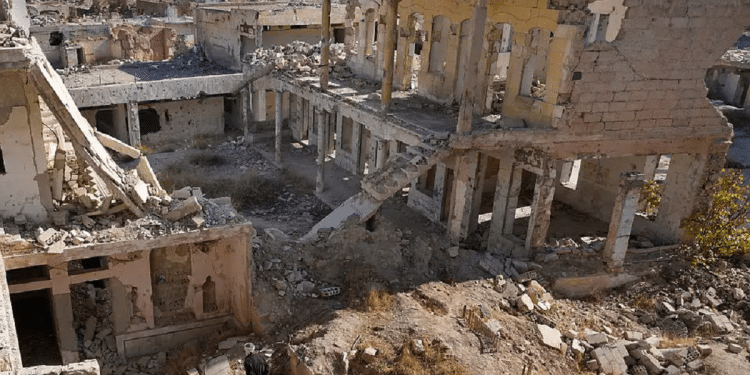Following the fall of the Assad regime, the handful of Jews remaining in Syria can once again visit one of the world's oldest synagogues in Damascus's Jobar suburb, which previously attracted worshippers from throughout the region.
The suburb, which was a dangerous zone during Syria's 13-year civil war and served as a battleground between regime forces and rebels, is now safe to visit again. The civil war left the area and the synagogue, known as Eliyahu Hanavi, in ruins. Walls and roofs have collapsed, and artifacts are missing. A marble sign at the entrance states in Arabic that it was built 720 years before Christ.
Syria was once home to one of the largest Jewish communities in the world. According to the Associated Press, after Jerusalem fell to Crusader forces in 1099, about 50,000 Jewish refugees fled to Damascus, making up nearly a third of its population. The community grew further with Jews escaping the Spanish Inquisition after 1492.
The numbers diminished significantly after Israel's establishment in 1948, and today only nine Jews remain. According to community leaders, almost all are elderly, and they believe no Jews will remain in the country within a few years.
"This synagogue means a lot to us," Bakhour Chamntoub, the 74-year-old head of Syria's Jewish community, told AP during his first visit in 15 years. Upon seeing parts reduced to rubble, he added, "I am frankly disturbed." Jews worldwide have contacted him offering to help rebuild.

Chamntoub refused to leave Syria during the civil war, while his 12 siblings departed. He told AP he is happy in Syria and surrounded by people who respect him. As one of the few Jews who openly speaks about his faith, he says he never encountered discrimination. Other community members prefer not to speak publicly for security reasons and fears of being labeled as spies or collaborators with Israel.
The Syrian Jewish community numbered about 100,000 at the start of the 20th century. During the Assad family's 54-year rule, Jews enjoyed religious freedom but were prevented from traveling outside the country until the early 1990s to prevent emigration to Israel. After restrictions were lifted with the beginning of Arab-Israeli peace talks, many more left.
Before Syria's 2011 conflict, Chamntoub and remaining community members would come to Jobar for Shabbat prayers. He recalled the Torah scrolls written on gazelle leather, chandeliers, and carpets that disappeared, likely stolen by looters.
Barakat Hazroumi, a Muslim born and raised near the synagogue, described to AP how worshippers would ask him to turn on lights or light candles on Shabbat. "It was a beautiful religious place," he noted, adding that the entire destroyed suburb "needs to be reconstructed from scratch."
Assad's forces recaptured Jobar from rebels in 2018 but imposed heavy security that prevented many from accessing the area. The new leadership under Hayat Tahrir al-Sham claims they will allow religious freedom for all faiths, despite some sectarian attacks primarily targeting the Alawite minority.
Today, Chamntoub lives in old Damascus's Jewish quarter, near the shuttered Maimonides Jewish school. He maintains his religious practices despite challenges, receiving annual kosher meat packages from his American siblings. He prepares meals for fellow community member Firdos Mallakh, 88, who has no remaining relatives in Syria.
As he observes the eight-day Hanukkah holiday alone at home, Chamntoub hopes that with the regime's fall, Syrians will enjoy more freedoms, economic and otherwise. Previously, he told AP, authorities prevented him from giving interviews without security clearance. "I am a Jew and I am proud of it," he declared.




